The recent news

June 26, 2021
Publications

► Full reference: Frison-Roche, M.-A., Notes taken for the summary report of the colloquium of Droit et Commerce, La concurrence dans tous ses états ("Competition in all its states"), June 26, 2021.
This text is the translation of the notes taken in French (this colloquium was in French.
____
Notes' Summary: The opinions around the "Competition in all its states" highlighted the choices available for what could be this branch of Law tomorrow: choice of a political nature between various possible definitions of Competition Law.
In method, the main thing is that this definition be clear. For this, this definition must be based on a principle and that the goal pursued by competition law is simple, so that in a second step, competition law can be easily articulated on the one hand with other branches of law. (by the care of the judge, in particular), on the other hand with "policies", such as "competition policy", then other policies (by the care of political authorities, especially European).
In essence, two conceptions of principle are opposed: either Competition Law will want to appropriate the goals of other branches, such as those of Regulatory and Compliance Law, or Competition Law will have the modesty to remain anchored in its definition as Market Law. This is the crossroads where we are.
____
► Method: Because of the richness and diversity of the comments made, in order to keep to the time limit, some passages have not been repeated orally.
Because it is a synthesis, the document is only based on what was said and does not include technical references, nor does it refer to personal work.
► Articulation of the notes taken while listening to the different interventions of the successive speakers:
During two days, listening to all the interventions on "Competition Law in all its states" has brought out the choices that are offered for what could be tomorrow this branch of law: they are choices of a political nature between various possible definitions of what should be Competition Law.
The most important thing is undoubtedly that this definition be clear; in order to be clear, it must be based on principle and the goal pursued by Competition Law must be simple, in order to be articulated with other branches of law (by the judge, in particular), and with "policies", such as "competition policy", and then other policies (by political authorities, in particular European ones).
The speakers proposed various, even opposing conceptions of what Competition Law should be, but all agreed on the fact that it has suffered many shocks and that, without a doubt, its recovery requires a common "culture" of Competition.
The evolution has attacked the very pillars of Competition Law in order to better reconstruct it by moving it from a mainly Ex Post perspective to a mainly Ex Ante perspective, by giving relevance to the objects themselves, notably to data, by taking into consideration human beings.
The evolution can take place by internalizing the perspectives of Regulation and Compliance in a Competition Law that becomes hypertrophied and political, which raises the question of the legitimacy of this "holistic" conception; it can also take place by a Competition Law that remains "self-centered" on its technical notions of market, price, etc., but articulates with the other branches of Law, economic or not. This is a political choice
It is in the hands not only of the States and the Parliaments, particularly with regard to the digital space, but also, and above all, in the hands of the supreme courts, a category to which the Court of Justice of the European Union belongs and to which everyone has constantly referred.
- Read the notes below in full

June 23, 2021
Organization of scientific events
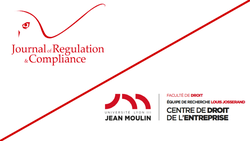
This scientific manifestation is placed under the scientific responsibility of Marie-Anne Frison-Roche and Jean-Christophe Roda. It is organized by the Journal of Regulation & Compliance (JoRC) and the Centre de Droit de l'Entreprise of Lyon 3 University.
It is the fourth colloquium of the cycle of colloquia organized in 2021 around the general topic of Juridictionnalization of Compliance.
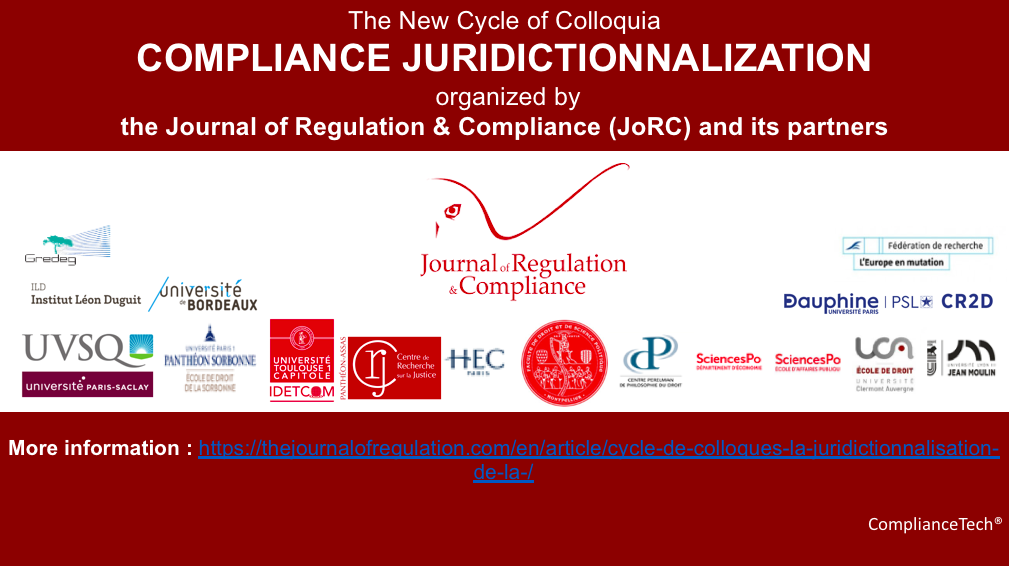
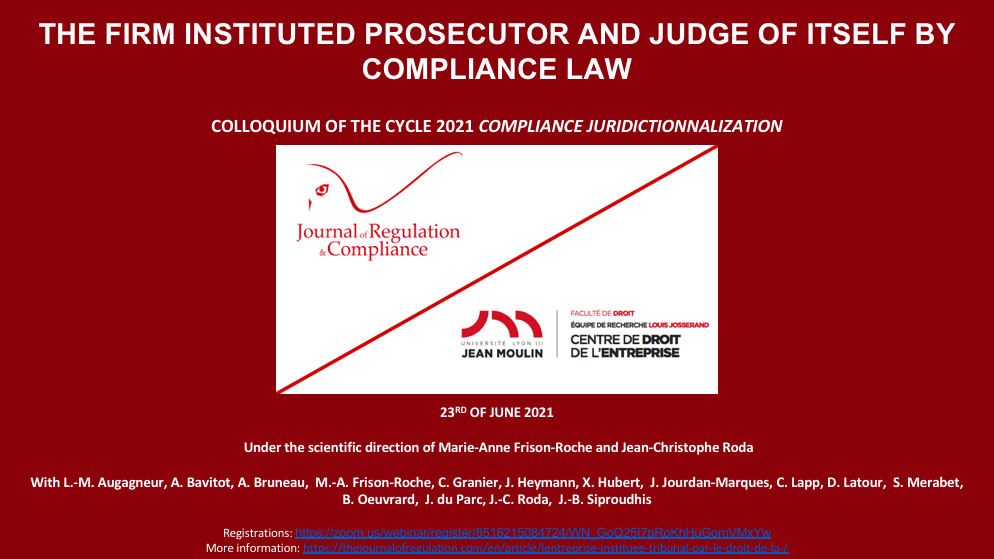
The different interventions will be then transformed into contributions in the books La juridictionnalisation de la Compliance and Compliance Juridictionnalization which will be published in the Regulation & Compliance serie, jointly published by the JoRC and Dalloz for the book in French and by JoRC and Bruylant for the book in English.
This colloquium will take place in Lyon 3 on 23rd of June 2021 with a limited audience. It will also be broadcasted in live on Zoom.
To register: https://zoom.us/webinar/register/8516215084724/WN_GoQ25I7pRoKhHuGomVMxYw
Presentation of the topic: Initially, it was through Criminal Law, inseparable from the trial, which forced companies to take charge of monitoring within themselves behavior likely to be deviant, the requirement of Ex Ante to be designed by the 'Ex Post of the jurisdictional. From this reversal of things, there has always remained this presence of the judge and the prosecution bodies in a Compliance Law which is nevertheless defined by its concern for the future and the Ex Ante tools within the company.
In doing so, the company becoming on the one hand a judge of itself, on the other hand a prosecutor of itself, it splits up, taking in reverse the most established procedural principles. Moreover, because of the monumental goals which constitute Compliance Law, companies become attorneys and judges of the others, or for the others, the cutting machines and the "supreme courts" being by name instituted to regulate in Ex Ante all different before that it does not become litigation. The Ex Ante of Compliance would then make the Ex Post disappear.
Method:
The colloquium which had to take place initially on 8th of April has been postponed to 23rd of June to enable speakers to meet and talk in face to face, with a limited audience.
These exchanges will be captured so that third parties can benefit from them, even before the publication of the works, La Juridictionnalisation de la Compliance and Compliance Juridictionalization, within which this work constitutes the basis for the development of a specific chapter.
Five practical cases will first be examined in five specific sectors, where this institution of the firm as prosecutor and judge of itself is particularly observable before both specific and more cross-sectoral themes are examined and discussed.
Will speak :
🎤Luc-Marie Augagneur, attorney before Lyon Court of Appeal, CVS Law Firm
🎤Alexis Bavitot, senior lecturer at Lyon 3 University
🎤Alain Bruneau, chief compliance officer at Natixis
🎤Jean-Marc Coulon, Head of Legal Infrastructure at Bouygues Construction
🎤Marie-Anne Frison-Roche, director of the Journal of Regulation & Compliance (JoRC)
🎤Cécile Granier, senior lecturer at Lyon 3 University
🎤Xavier Hubert, director of Compliance at Engie
🎤Jérémie Jourdan-Marques, professor at Lyon 2 University
🎤Jérémy Heymann, professor at Lyon 3 University
🎤Daphnée Latour, attorney before Paris Court of Appeal
🎤Christophe Lapp, founding partner of Altana law firm
🎤Samir Merabet, senior lecturer at Lyon 3 University
🎤Béatrice Oeuvrard, Public Policy Manager at Facebook France
🎤Jean du Parc, Bâtonnier
🎤Jean-Christophe Roda, professor at Lyon 3 University and director of the Centre de droit de l'entreprise (Center of Company Law)
🎤Jean-Baptiste Siproudhis, director Ethics, Integrity and CSR at Thalès
June 23, 2021
Conferences
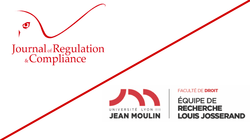
 Full reference: Frison-Roche, M.-A., The judge-judged: Articulate words and things face to the difficult conflicts of interest, in L'entreprise instituée Procureur et Juge d'elle-même par le Droit de la Compliance, colloquium co-organized by the Journal of Regulation & Compliance (JoRC) and Lyon 3 Law School, 23rd of June 2021.
Full reference: Frison-Roche, M.-A., The judge-judged: Articulate words and things face to the difficult conflicts of interest, in L'entreprise instituée Procureur et Juge d'elle-même par le Droit de la Compliance, colloquium co-organized by the Journal of Regulation & Compliance (JoRC) and Lyon 3 Law School, 23rd of June 2021.
____
This conference was in French ; the Working Paper on which this conference was based is in French and in English: The judge-judged: Articulate words and things face to the stressful conflicts of interest
📅 June 23, 2021, 9h30 - 18h30
🧭 Lyon, Lyon 3 Law School, "Salle de la Rotonde" and online
____
📊 Read the slides on which this conference is based (in French)
🎥 See the video of this conference.
📝 Read the general program of this colloquium (in French)
📝 Read the working paper on which this conference is based (in English)
___
📅 This colloquium is part of the cycle of colloquia in 2021 organized by the Journal of Regulation & Compliance (JoRC) and its partners about Compliance Juridictionnalization.
📕 📘 The conference is the first basis for the writing of an article, forthcoming in a book whose the French version is La juridictionnalisation de la Compliance, co-published by the Journal of Regulation & Compliance (JoRC and Dalloz, and whose the English version Compliance Juridictionnalisation, is co-published by the Journal of Regulation & Compliance (JoRC) and Bruylant.

____
🔻 Summary of the conference: read below.

June 22, 2021
Publications

 Full Reference: Frison-Roche, M.-A., The Judge-Judge ; articulating words and things in the face of the challenging conflict of interest born by Compliance Law, Working Paper, June 22, 2022.
Full Reference: Frison-Roche, M.-A., The Judge-Judge ; articulating words and things in the face of the challenging conflict of interest born by Compliance Law, Working Paper, June 22, 2022.
____
🎤 This Working Paper had been made to prepare a conference (done in French).
This conference took place in the Academic Colloquium, L'entreprise instituée Procureur et Juge d'elle-même par le Droit de la Compliance, in Lyon, the 23rd June 2021.
____
📝this Working Paper is the basis of an article to be published
📕 in its French version in the book La juridictionnalisation de la Compliance, in the Series 
📘 in its English version in the book Compliance Juridictionnalisation, in the Series 
____
► Working Paper Summary: Puisque le thème de cette réflexion générale sur L'entreprise instituée Juge et Procureur d'elle-même par le Droit de la Compliance porte sur un ensemble d'autres réflexions soucieuses de l’ajustement des mots et des choses, la façon dont le rapport entre les uns et les autres évoluent, ce travail va porter sur la question de savoir si cette évolution est radicale ou pas, lorsqu'on parle de "juge".
Car, "juger" c'est un mot que le Droit a disputé à d'autres discipline!footnote-2090s, mais qu'il s'est approprié pour non pas tant avoir davantage de pouvoirs, par exemple celui de surveiller et de punir, mais au contraire s'imposer des limites, puisqu'à celui qui juge il a mis aux pieds les chaines de la procédure, ce qui rend supportable pour l'autre un tel pouvoir exercé!footnote-2091. C'est pourquoi ceux qui veulent le pouvoir de juger voudraient souvent n'en avoir pas le titre, car avoir de jure le titre de juge c'est être soumis au régime corrélé, c'est se soumettre à l'exactitude procédurale.
Le Droit repère qui juge et oblige ce si-puissant à la procédure. Mais il a aussi le pouvoir d'instituer juge et tous les personnages du procès. Il le fait d'ordinaire avec clarté en distinguant les uns des choses. C'est si important que ce conseil a valeur constitutionnelle. Ainsi, non seulement celui qui juge doit être nommé ainsi mais l'appareillage procédurale qui va avec le personnage et qui constitue à la façon une façon de faire et des droits fondamentaux, ne sont pas "concédés" par bonté ou dans un second temps : c'est un bloc. Si l'on ne voulait pas avoir à supporter les droits processuels, il ne fallait vouloir être juge. Certes on pu en conclure que la procédure serait donc devenue "substantielle" ; par cette élévation, il s'agit plutôt de dire que la procédure ne serait plus une "matière servante": c'est une sorte de déclaration d'amour pour la procédure, tant qu'on affirme qu'à l'acte de juger, d'enquêter ou de poursuivre, sont "naturellement" attachées les droits pour celui qui risque d'en être l'objet.
Le Droit de la Compliance, à la recherche d'alliés pour atteindre les Buts Monumentaux pour l'atteinte desquels il a été institué, va requérir, voire exiger d'entreprises privées qu'elle aillent elles-mêmes rechercher, c'est-à-dire enquêter, des faits susceptibles de lui être reprochés. Le Droit de la Compliance va aussi exiger qu'elles poursuivent les personnes ayant commis ces faits. Il va encore exiger qu'elles sanctionnent les faits que des personnes ont commis en son nom.
On le comprend bien du point de vue de l'efficacité Ex Ante. La confusion est souvent très efficace. Par exemple il est plus efficace que celui qui poursuit soit aussi celui qui instruise et qui juge, puisqu'il connait bien le dossier. D'ailleurs il est plus efficace qu'il prenne aussi les règles, ainsi il connait mieux que quiconque "l'esprit" des textes. Cela fut souvent souligné en Droit de la Régulation. Mais tout cela ne va pas de soi.
Pour deux raisons, l'une extérieur et l'autre intérieure.
La première raison, extérieure, tient que l'on ne pourrait pas "nommer" juge qui ne l'est pas. Cela serait trop facile, car il suffirait alors de désigner quiconque, voire de le faire soi-même pour s'approprier le régime qui va avec, pouvoir notamment d'obtenir qu'autrui obéisse alors même qu'il n'est pas subordonné ou qu'il transmette des informations, alors même qu'il serait concurrent : il faudrait alors rappeler seul le juge pourrait se nommer juge ! et dans ce temps nouveau, voilà que des entreprises seraient juges, procureurs, enquêteurs ! Les temps seraient donc si graves et en si grand désordre qu'il faudrait en revenir à cette tautologie là... !footnote-2092 Mais sommes-nous dans une telle radicalité ? D'ailleurs, les juges ont-ils "l'apanage" du jugement et le Droit n'admet-il pas cela depuis longtemps ? Dès l'instant que la procédure est là en Ex Ante et le contrôle du juge en Ex Post ?
La seconde raison, interne à l'entreprise, tient à ce que l'entreprise enquête sur elle-même, se juge elle-même, se sanctionne elle-même. Or, la personne morale n'exprimant sa volonté qu'à travers soit ses organes, l'on souligne en pratique les difficultés pour un même être humain de formuler des griefs, en tant qu'il est le mandataire de la personne morale, à la personne physique qu'il est lui-même. Les deux intérêts des deux ne sont pas les mêmes, sont souvent opposés, et comment les secrets de l'un peuvent être tenus à l'égard de l'autre. C'est tout le mystère, voire l'artifice de la personnalité morale qui apparaît et l'on comprend mieux que le Droit de la Compliance ne veut plus utiliser cette notion étrange. Car toues les règles de procédure ne peuvent masquer que se poursuivre soi-même n'a pas plus de sens que de contracter avec soi-même. Ce conflit d'intérêts est impossible à résoudre car nommer un même individu x puis le nommer y, en déclarant ouverte la dispute entre eux n'a pas de sens.
Ce dualisme impossible à admettre dès l'instant qu'il s'agit de faire jouer ces fonctions à l'égard des mandataires sociaux peut retrouver vie en instituant des tiers de confiance qui vont porter les secrets et les oppositions. Par exemple par la désignation de deux avocats distincts par l'être humain mandataire et l'être humain dirigeant, chaque avocat pouvant avoir des secrets l'un pour l'autre et s'opposer l'un à l'autre. Ces espaces de reconstitution des oppositions si "naturelles" en procédure entre celui qui juge et celui qui est jugé peuvent aussi avoir prendre la forme technologique des plateformes : là où il n'y a plus personne, là où le process a remplacé la procédure, il n'y a plus non plus de jugement humain. L'on mesure ainsi que la crainte des conflits d'intérêts est si forte que l'on se résigne à dire que seule la machine serait "impartiale", dérisoire conception de l'impartialité contre laquelle il convient de lutter.
Cela permet alors d'aboutir à une dernière question : l'entreprise peut-elle prétendre exercer le pouvoir juridictionnel de poursuivre et de juger et d'enquêter sans même se prétendre ni procureur, ni juge d'instruction, ni tribunal ? L'avantage serait de pouvoir se soustraire au régime juridique que le Droit classique attache à ses mots-là, principalement les droits de la défense, les droits d'action et le principe de publicité de la justice. Quand Facebook dit "réagir" à la décision du 5 mai 2021 adoptée par ce qui ne serait qu'un Oversight Board pour décider pourtant "en conséquence" une suspension de 2 ans du compte de Donald Trump, l'art des qualifications semble être utilisé afin d'éviter toute contrainte de régime. Mais cet art de l'euphémisme est bien ancien. Ainsi les Etats, lorsqu'ils voulurent accroître la répression, présentèrent la transformation du système comme un adoucissement de celui-ci à travers la "dépénalisation" du Droit économique, transféré des tribunaux correctionnels aux AAI. L'efficacité en fût grandement accrue, puisque les garanties de la procédure pénales ont cessé de s'appliquer. Mais 20 ans plus tard, les mots retrouvèrent leur chemin vers les choses : sous le Droit pénal, dormait la "matière pénale", qui requière la même "impartialité". Un juge un jour l'affirma et tout fut changé. Attendons donc ce qu'en diront les Cours, puisqu'elles sont les maîtres des qualifications, comme le dit l'article 12 du Code de procédure civil, qu'écrivit Motulsky.
Updated: June 14, 2021 (Initial publication: June 11, 2021)
Interviews

► Full reference : Frison-Roche, M.-A., "The European Public Prosecutor's Office is a remarkable contribution to Compliance Law" (« Le parquet européen est un apport considérable au droit de la compliance »), interview with Olivia Dufour, Actu-Juridique, June 11 and 14, 2021.
💬 Read the interview (in French)
❓ Questions asked (translated by us) :
- Actu-Juridique : In an article published on LinkedIn, you seemed very enthusiastic concerning the creation of the European Public Prosecutor's Office. This Prosecutor's Office seems likely to reinforce the fight against economic delinquency, but is not it strange a prosecution without a State?
- Actu-Juridique : You consider that it is a great progress for Compliance, why?
- Actu-Juridique : Why ex ante ? The justice generally intervenes in ex post ?
- Actu-Juridique : There still is a limit, it is the sovereignty of States which can refuse this prosecutor...
- Actu-Juridique : Let's come back to Compliance, to what extent it will gain in efficiency?
- Actu-Juridique : A prosecutor without Sate, omnipotent prosecutors, the end of the distinction between pursuit and investigation... all of this seems to disregard defense rights!
_______
June 2, 2021
Publications
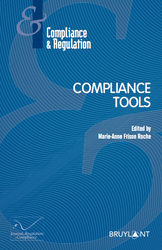
Full reference : Frison-Roche, M.-A., Incentives and Compliance, a promising couple to increase the Compliance Law utility, in Frison-Roche, M.-A. (ed.), Compliance Tools, series "Régulations & Compliance", Journal of Regulation & Compliance and Bruylant, 2021, p. 141-148
___
Summary of the article: The theory of incentives targets the mechanisms which do not use directly constraint (except to present sanctions themselves as incentives) but which leads nevertheless to expected behaviors. To appreciate the links which must or must not be done between incentives and Compliance, we should proceed in two times.
First, the association appears natural between incentive mechanisms and "Compliance Law" since the later is defined in a dynamic way. Indeed, if it is defined placing its legal normativity in its "monumental goals", as the end of corruption, the detection of money laundering in order to underlying criminality disappears, or as the effective protection of environment or the concrete care of human beings, then what matters is not the means in themselves but the effective tension towards these "monumental goals". In this perspective, what was related to public policies led by States, because they are definitively not able to do it, the charge is internalized in the firms which are able to tend towards this goals: "crucial operators" because they have the geographical, technological, informational and financial means.
In this perspective, the internalization of public willingness provoking a split with the concept of State linked to a territory which deprives Politics of its constraint power, incentive mechanisms appear as the most efficient mean to reach these monumental goals. They appear as this "natural" mean both negatively and positively defined. Negatively in which they do not need in Ex Ante institutional localizable sources and sanction power in Ex Post: it is enough to substitute the interest to obligation. Positively, incentives relay through operators' strategies what was the so critical and joked form of public action: the "plan". The duration is thus injected thanks to Compliance mechanisms, as we can see it through the development of it in the care for environment ("plan climat") or through the educational mechanism, which could be conceived only in duration.
However, the opposition seems radical between Compliance Law and Incentives. And this because of three convictions often developed and that we have to overcome. First, the idea that in a general way, there would be a Law only if there is a mechanism of immediate constraint which is associated to the norm. As long as the incentive is not based on obligation, then it will be nothing... Secondly, and as if that were a kind of consolation ..., Compliance would not be really Law either ... We so often say that it is only about a methodology, a range of processes without sense, procedures to follow without trying to understand, process that algorithms integrate in a mechanic without end and without sense or that on the contrary, Compliance would be full of sense by Ethics and Morality, which are far from Law. While incentives talk to the human spirit which calculate, Compliance would be so a process through which machines will be connected to other machines, so an extra soul, where calculation has no place... Thirdly, solutions would be to be find in Competition Law because it can do without States, submit them and approach what is a-sectorial, especially finance and digital, the world being financialized and digitalized. The violence of Competition Law which comes in Ex Ante thanks to "Compliance sanctions" applying for example to essential infrastructures Law, by continuing to deny the salience of the duration and taking care of the "market power" would be also not compatible with a marriage with incentive mechanisms which rely on duration and power of those to which it is applied, converging towards goals, which are set by what Competition Law ignores: the project. This project which pretends to build the future is the one of politics and of companies, which use their deployed power in time to concretize it. It is without any doubt there that the future of Europe is.
To overcome this triple difficulty, it is thus necessary, in a second time, to modify our conception of Law, especially thanks to Compliance Law, in which this new branch is autonomous from Competition Law, and even sometimes opposed to it, in order to the insertion of incentive mechanisms permit to unknown or against Competition Law organizations to reach "monumental goals" which are imperative to take into consideration. For example, the taking into consideration of climate challenges or the building of a sovereign identity of the data. This is expressly set by European Commission which supervises such initiatives, supervision being what is articulated with Compliance, in a couple that go beyond Regulation, and replaces in Ex Ante Competition Law, salient branch for Ex Post. All the texts which are in the process of expressing it are based on this reformed couple: Compliance and Incentive.
This couple supposes that we recognize as such the existence of companies as project carriers, project which is the creation of marketed wealth circulating on a market, which could be an industrial project specific to a geographical zone both economical and political. Regulation is deployed to go away from the notion of sector and to transform itself in supervision of crucial firms in the correspondance between the project and the action, what refers to the notion of "plan". In this, banking supervision is just the advanced bastion of all thematic, energetic, climatic and health plans, or more broadly industrial and technological that could by incentive be implemented, this conception of Compliance permitting to build zones which are not reduced to immediate market exchange. The incentive corresponds to the fact that Compliance Law relies on the power of the firm to reach its own political goals, for example fighting against disinformation in the digital space or obtaining a healthy environnement. This supposes that Compliance stops to be only conceived as a model of rules effectivity, for example of Competition Law, to be recognized as a substantial branch of Law. A branch which expresses political goals. A branch which is anchored in crucial firms whose it recognizes the autonomy with regards to markets. This makes it possible, in particular through the coupling with incentive mechanisms leading to long-term collaborative operations supervised by public authorities, not to be governed by simple Competition Law, inapt to bring projects to fruition.
____
Read a general presentation of the book in which the article has been published.
____
June 2, 2021
Publications

Full Reference : Frison-Roche, M.-A..,Rights, primary and natural Compliance Tools, in Frison-Roche, M.-A. (ed.), Compliance Tools, series "Régulations & Compliance", Journal of Regulation & Compliance (JoRC) and Bruylant, 2021, p. 319-342
___
Article Summary: In the traditional conception of the architecture of the sectors regulated by Law, and in Compliance Law which extends the regulatory techniques, rights have little place. But this configuration no longer takes place; on the contrary, rights are at the center of Regulatory and Compliance systems, and will be more and more so. They are and will be the primary tools of Compliance Law because they constitute a very effective "tool" to ensure the entire functioning of a system whose goals are so difficult to achieve. Because every effort must be done to achieve these goals, the public authorities not only rely on the power of crucial operators, but also distribute prerogatives to people and organizations who, thus encouraged, activate the Compliance system and participate in the achievement of the "monumental goal". Rights can prove to be the most effective tools for actually achieving the goals set, so much so that they can be seen as "primary tools".
But it is pertinent to have more pretension and to conceive rights as the most "natural" tools of Compliance Law. Indeed because all the Monumental Goals by which Compliance Law is defined can be expressed by the protection of persons, that is to say to the effectiveness of their prerogatives, by a mirror effect between rights. given as tools by Law by to persons and rights which constitute the very goal of all Compliance Law, in particular the protection of all human beings, even if they are in a situation of great weakness, rights becoming a "natural tool" of Compliance Law.
We are only at the beginning of their deployment and it is undoubtedly on them that Digital space in which we now live would be regulated, so that we will not suffocated there and that it will constitute for people a civilized space.
____
Read the General Presentation of the book in which this article has been published
____
June 2, 2021
Publications

Full Reference: Frison-Roche, M.-A., Training: content and container of Compliance Law, in Frison-Roche, M.-A. (ed.), Compliance tools, series "Régulations & Compliance", Journal of Regulation & Compliance (JoRC) and Bruylant, 2021, p. 245-264
___
Summary of the article
Firstly, as Training is a specific Compliance tool, it is supervised by Regulators. It becomes mandatory when it is contained in Compliance programs or sanction decisions. Since effectiveness and efficiency are legal requirements, what is the margin of companies to design them and how to measure the result?
Secondly, as long as each Compliance tool includes, more and more, an educational dimension, we can take each of them to identify this perspective. So even condemnations and prescriptions are so many lessons, lessons given, lessons to be followed. The question is then to know who, in this so pedagogical Compliance Law, are the "teachers"?
____
This article is based on a bilingual Working Paper, including additional technical developments, pop-up notes and hypertext links.
Consult an overview of the volume in which the article was published.
____